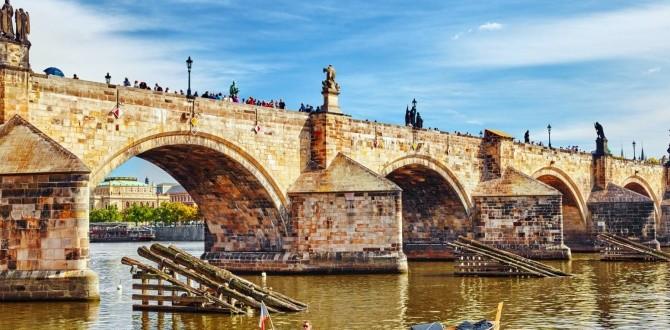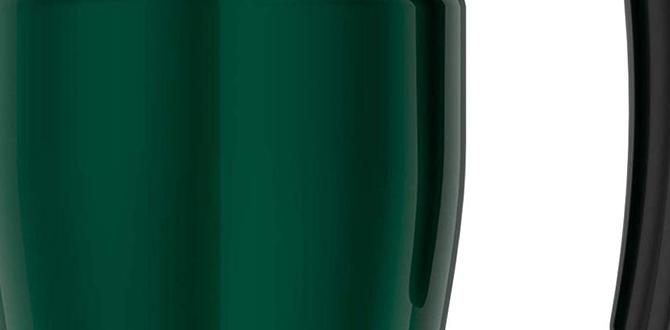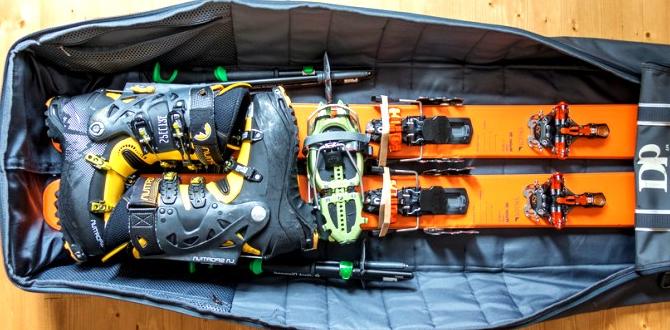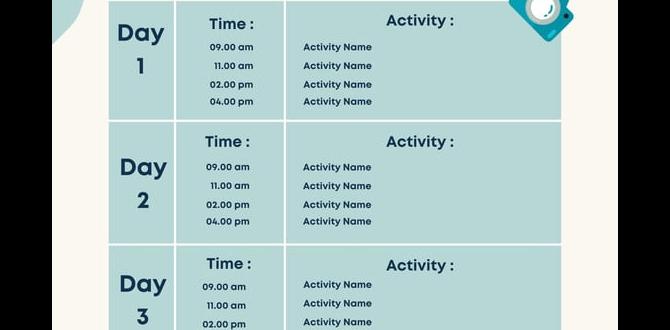Accra Best Time To Visit Without Crowds: Aim for the Shoulder Seasons (February-March, October-November) for fewer tourists and pleasant weather.
Planning a trip to Accra, Ghana, but feeling a little overwhelmed by where to start? You’re not alone! Many travelers wonder about the perfect time to visit this vibrant West African city. We all want that sweet spot: sunshine, good vibes, and fewer crowds. Finding that ideal window can feel like a puzzle, especially when you’re looking for a more relaxed experience. Don’t worry, we’ve got you covered. This guide will break down the best times to visit Accra, focusing on those precious low-crowd periods, so you can enjoy everything this amazing city has to offer with more ease and comfort.
Understanding Accra’s Climate
Accra, situated right on the coast of Ghana, enjoys a tropical savanna climate. This means it’s generally warm and humid throughout the year, with distinct wet and dry seasons. The proximity to the equator means you won’t find dramatic temperature swings like in temperate climates. Instead, the main factors influencing your visit will be rainfall and humidity. Understanding these patterns is key to choosing the perfect time to visit, especially if you’re aiming to avoid the peak tourist season and the associated crowds.
The city is essentially divided into two main periods:
- The Dry Seasons: Generally from November to March. These months offer the most sunshine and the least rain.
- The Wet Seasons: Typically from April to October. During this time, rainfall increases significantly, often with heavy, short-lived downpours.
Within these broad categories, there are nuances that make certain months particularly appealing for travelers seeking a more serene experience. Let’s dive into what makes each period unique.
Accra’s “Four” Seasons Explained
While West Africa doesn’t have the four distinct seasons of North America or Europe, Accra experiences periods that feel like them due to variations in rain and sun. Knowing these can help you pack and plan more effectively.
Harmattan Season (Dry and Cool): December to February
This period is often considered one of the best times to visit Accra weather-wise. The Harmattan is a dry, dusty trade wind that blows from the Sahara Desert. It brings cooler temperatures (relatively speaking!) and lower humidity. The air can be hazy, especially in the mornings, due to the fine dust particles, but it’s usually a welcome break from the typical humidity.
- Pros: Pleasant temperatures, low humidity, excellent for outdoor activities, fewer insects.
- Cons: Can be hazy, which might affect visibility for photography. This is also a popular time for both local and international travelers, so crowds can increase towards the end of this period, especially around Christmas and New Year.
The First Wet Season: April to June
This is one of Accra’s two main rainy periods. The rains here are often characterized by intense, but usually short, downpours. While it’s a wet season, it doesn’t typically rain all day, every day. You can still expect plenty of sunshine between showers. The landscape becomes lush and green, which is beautiful, but the increased humidity can be noticeable.
- Pros: Lush scenery, potentially fewer tourists than the dry season, slightly lower prices for accommodations might be found.
- Cons: Higher humidity, frequent rain showers can disrupt outdoor plans, more mosquitoes.
The Second Dry Season (Short Dry Spell): July to October
This is a bit of a transition period. While often categorized as dry, you might still encounter occasional light showers, especially early on. The humidity might still be present but generally less intense than during the main wet season. It’s a mixed bag, which can sometimes mean fewer tourists are visiting.
- Pros: Fewer crowds, generally good weather with occasional rain.
- Cons: Can be a bit unpredictable regarding rainfall, humidity levels can vary.
The Main Wet Season: July to September
This is the period with the most significant rainfall in Accra. Expect heavy, often daily, rain. While it might disrupt some leisurely outdoor activities, it’s also a time when the city is less crowded. The intensity of the rain can lead to localized flooding in some areas, so it’s wise to be prepared and have backup indoor activities planned. For those unbothered by occasional downpours and seeking genuine solitude, this could be a good option.
- Pros: Very low tourist numbers, vibrant green landscapes, often the lowest prices for flights and accommodation.
- Cons: Heavy rainfall can impact travel and outdoor activities, higher humidity, potential for flooding.
The Golden Window for Low Crowds and Pleasant Weather
If your priority is to experience Accra with minimal crowds and enjoy comfortable weather, there are specific times that truly stand out. These are often referred to as the “shoulder seasons” in tourism – the periods just before or after the peak travel times.
February to March: The Sweet Spot
Following the prime Harmattan season, February and March offer a fantastic balance. The temperatures are still very pleasant, the humidity hasn’t reached its peak, and the intense rains of the wet season are still a few months away. While the holiday crowds have dispersed, the tourist numbers are generally lower than during December and January. This makes it an ideal time for exploring Accra’s markets, historical sites, and vibrant streets without feeling overwhelmed.
- Why it’s great for low crowds: Post-holiday lull, preceding the main rainy season.
- Weather: Warm, sunny days with relatively low humidity.
- Activities: Perfect for walking tours, visiting beaches, and experiencing local life.
October to November: The Pre-Dry Season Advantage
As the main rainy season winds down and the Harmattan begins to blow in, October and November emerge as prime candidates for a low-crowd visit. While there might be a lingering shower or two in early October, the latter part of the month and November typically bring drier conditions and cooler, more comfortable temperatures. The lushness from the rains is still evident, making the city look vibrant. Crucially, the major tourist influx for year-end holidays hasn’t begun yet.
- Why it’s great for low crowds: Before the busy holiday season, following the peak of the rains.
- Weather: Transitioning to drier and cooler weather, still warm and sunny with decreasing humidity.
- Activities: Excellent for cultural immersion, exploring art galleries, and enjoying Ghanaian cuisine.
These two windows—February-March and October-November—are your best bet for experiencing Accra’s charm with a sense of tranquility. You get the benefits of good weather without the peak season hustle.
Avoiding Peak Seasons for a Quieter Accra
To truly maximize your low-crowd experience, it’s also helpful to know when Accra is at its busiest. Being aware of these times allows you to strategically plan your visit for maximum enjoyment and minimal queues.
- Peak Tourist Season: December to January. This period coincides with school holidays in many parts of the world and pleasant Harmattan weather, making it a very popular time for visitors. Expect larger crowds at major attractions and potentially higher prices for flights and accommodation.
- Major Local Festivals/Events: While specific dates change annually and are often announced closer to the time, Ghana celebrates various national holidays and cultural festivals. These can draw larger local crowds to specific areas or events, so it’s worth checking a local events calendar if you’re visiting during such times and wish to avoid them or immerse yourself intentionally.
By sidestepping these peak times, you ensure a more intimate and personal encounter with Accra’s rich culture and beautiful landscapes.
Planning Your Trip for Comfort and Convenience
Now that you have a better idea of the best times for fewer crowds, let’s talk about making your trip as comfortable and stress-free as possible, no matter when you decide to go. Remember, travel should be about enjoyment and discovery, not about worrying over the little things – and that applies to everyone, including those who might need extra comfort and support.
| Month(s) | Crowd Levels | Weather | Notes |
|---|---|---|---|
| February – March | Low to Moderate | Warm, sunny, low humidity. Pleasant. | Best low-crowd window. Ideal for exploring. |
| April – June | Moderate | Warm, humid, frequent rain showers. Lush greenery. | Can experience heavy rain; plan indoor activities. |
| July – September | Low | Warm, humid, heavy rainfall. | Fewest tourists. Be prepared for rain. |
| October – November | Low to Moderate | Transitioning to dry, warm, decreasing humidity. | Second best low-crowd window. Great for early exploration. |
| December – January | High | Warm, dry, low humidity (Harmattan). Very pleasant. | Peak tourist season. Expect crowds and higher prices. |
Packing Essentials for Accra
Regardless of the season, packing smart is essential. For Accra, think light, breathable fabrics.
- Lightweight, breathable clothing (cotton, linen).
- A light rain jacket or umbrella, especially if visiting during the wet season.
- Comfortable walking shoes or sandals.
- Sunscreen, a hat, and sunglasses for sun protection.
- Insect repellent.
- Any personal comfort items necessary for your well-being, like travel-sized toiletries.
For travelers who require them, packing an adequate supply of adult diapers or child diapers is crucial for peace of mind. Having discreet, reliable products ensures that unexpected needs don’t become a source of stress during your explorations. Look for absorbent, breathable options that offer comfort and security, perfect for long days of sightseeing or travel. Websites offering discreet shipping can be a lifesaver for stocking up before your trip.
Navigating Accra: Transportation Tips
Getting around Accra can be an adventure in itself.
- Taxis and Ride-Sharing: Readily available and a convenient option. Agree on the fare before starting your journey with regular taxis. Apps like Uber and Bolt are reliable and offer fixed pricing.
- Tro-tros: These are shared minibuses that are the backbone of public transport. They are very affordable but can be crowded and follow set routes, which might not be ideal for first-time visitors or those seeking maximum comfort.
- Walking: For short distances in specific neighborhoods, walking is a great way to soak in the atmosphere. Be mindful of traffic and uneven pavements.
When traveling with family, especially with young children or if you require special assistance, pre-booking airport transfers or using ride-sharing services can significantly ease the transition.
Ensuring Comfort on Long Journeys
Whether you’re flying into Kotoka International Airport (ACC) or embarking on a long bus journey, comfort is key.
- Hydration: Drink plenty of water. The tropical climate can be dehydrating.
- Snacks: Pack portable, non-perishable snacks. This is especially helpful for families traveling with children or adults who have specific dietary needs or require easy access to sustenance.
- Comfort Aids: For prolonged travel, consider items like neck pillows. For adults or children who may need them, ensuring you have a comfortable supply of adult diapers or child diapers readily accessible in your carry-on can prevent anxiety and ensure a smoother journey. Brands that focus on discretion and advanced absorbency can make a world of difference.
- Ventilation: If using public transport, try to secure a seat with better airflow if possible.
Responsible Tourism in Accra
Engaging respectfully with the local culture enhances your experience and benefits the community.
- Learn a few basic phrases in Twi or Ga, the local languages.
- Always ask for permission before taking photos of people.
- Support local businesses by shopping at markets and eating at local eateries.
- Be mindful of your environmental impact.
Understanding and respecting cultural norms, especially around dress codes when visiting religious sites or more traditional areas, is also an important aspect of responsible travel.
External Resources for Your Accra Adventure
To help you further plan your trip and ensure you have all the necessary information, here are some helpful resources:
- Ghana Tourism Authority: For official information on attractions, events, and travel advisories. You can usually find their official website by searching for “Ghana Tourism Authority”.
- World Health Organization (WHO) – Ghana: For health and vaccination recommendations for travelers. Check the WHO’s country-specific travel health advice for Ghana.
- Local Weather Forecasts: Services like AccuWeather or The Weather Channel provide detailed forecasts for Accra, which are invaluable for daily planning.
These resources can provide up-to-date information that will help you tailor your trip perfectly.
Frequently Asked Questions About Visiting Accra
Q1: When is the cheapest time to visit Accra?
The cheapest times to visit Accra are generally during the low seasons: April to June (first wet season) and July to September (main wet season). Fewer tourists mean hotels and flights often offer lower prices. However, be prepared for significant rainfall and higher humidity during these months.
Q2: Is Accra safe for solo travelers?
Accra is generally considered one of the safer capitals in West Africa for solo travelers. Like any major city, it’s important to be aware of your surroundings, avoid displaying valuables, and stick to well-lit, populated areas, especially at night. Researching your accommodation and transport options beforehand is also recommended.
Q3: What should I pack for a trip to Accra?
Pack light, breathable clothing made from natural fabrics like cotton or linen. Include a light rain jacket or umbrella if visiting during the wet season, comfortable walking shoes, sunscreen, a hat, sunglasses, and insect repellent. It’s also wise to pack any personal comfort items you might need, including hygiene products like adult diapers or child diapers if necessary, to ensure a stress-free trip.
Q4: Is it too hot to visit Accra in December?
December is generally a very pleasant month in Accra. It’s part of the Harmattan season, characterized by dry air and relatively cooler temperatures compared to other times of the year. While it’s still warm, it’s usually not uncomfortably hot, making it a popular time for tourists.
Q5: What are the main cultural attractions in Accra?
Key cultural attractions include the Kwame Nkrumah Mausoleum, the National Museum of Ghana (check its current operational status), Independence Square, Jamestown, the Artists Alliance Gallery, and the bustling Makola Market. These offer insights into Ghana’s history, art, and daily life.
Q6: Can I easily find adult diapers in Accra?
While specific brands and availability can vary, you can typically find adult diapers and similar hygiene products in larger pharmacies and supermarkets in Accra. However, if you use a specific brand or require a certain type, it is always safer and more convenient to bring an adequate supply from home to ensure you have exactly what you need for comfort and peace of mind throughout your trip.
Conclusion: Your Accra Journey Awaits
Accra is a city bursting with life, culture, and history, offering an unforgettable experience for every traveler. By understanding the nuances of its climate and the ebb and flow of visitor numbers, you can strategically choose the perfect time to visit for a more relaxed and enjoyable journey. The shoulder seasons, particularly February to March and October to November, present the sweet spot for fewer crowds and delightful weather.
Remember to pack smart, stay hydrated, and embrace the adventure that awaits. Whether you’re exploring ancient forts,







